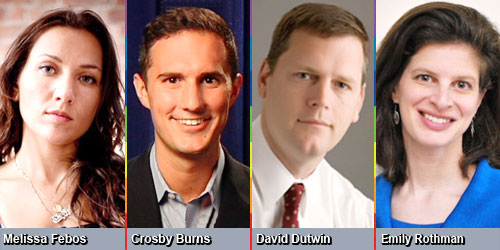Compiled by Howard Israel

S/he Said
"Bisexuality made sense to me, in theory, before I ever kissed a girl. And this was pre-Madonna kissing Britney Spears, pre-'Girls Gone Wild' (at least in my house, where we watched only PBS). My conception of girls kissing girls was not defined by a male gaze; I grew up with books like 'Closer to Home: Bisexuality and Feminism' on the shelves. My mother was a Buddhist therapist, and I had known before our landmark conversation that she not only identified as bisexual but moreover understood that being one was largely unremarkable. It seemed logical to me that people were bisexual until proven otherwise."
-Melissa Febos, in her column titled "Bisexual in a Small Town: How My Family Helped Me Deal," http://www.alternet.org, Apr. 11.
Read the full article here
"Strengthening the economic security of American families remains a key policy priority for decreasing poverty, reducing inequality, and growing our economy through a sustained and supported middle class. Not all families, however, are equal under the law. Unfortunately, many government-sponsored programs treat gay and transgender families differently than their straight and nontransgender counterparts. Due to narrow definitions of who constitutes a 'family,' many of the more than 2 million children living with gay and transgender families do not have the same access to the economic safeguards afforded to other children in the U.S. today. Moreover, this discrimination in government programs exacerbates the economic insecurities created by the high rates of discrimination facing the gay and transgender population. Discrimination in health care, housing, and the workplace leaves far too many gay and transgender families without health insurance, affordable housing, and a job to make ends meet."
-Crosby Burns, Research Associate, LGBT Research and Communications Project, Center for American Progress, in his article titled "The Federal Budget and Gay and Transgender Families – Not All Families Are Equal Under the Law," http://www.americanprogress.org, Apr. 11.
Read the full article here
"There is a clear misperception among the general population about where Latinos stand on LGBT issues, partly because the media pushes this narrative that the culture and values of Latinos and LGBT progress are simply incompatible. Such misperceptions manifest in story after story about a particular Hispanic group opposing a gay rights bill, even though this anti-gay sentiment is not reflective of all Latinos. In reality, as society is evolving on LGBT issues and becoming more accepting of this community, so too are Hispanics. Latinos mirror the general population in that there are groups within the Hispanic community that are more intolerant than others. The highly religious and those less familiar with American cultural values in particular tend to hold less accepting views of LGBTs. Across the board, we're seeing that exposure to the LGBT community is really the key to acceptance and tolerance for Latinos."
-David Dutwin, Vice President, Social Science Research Solutions (SSRS) and author of the report titled "LGBT Acceptance and Support: The Hispanic Perspective," an in-depth look at how Latinos view gays and lesbians within their own community and their level of support for LGBT issues, countering assumptions that Hispanics are more anti-gay than other segments of society, http://www.hispanicallyspeakingnews.com, Apr. 14. The report was co-released by NCLR (National Council of La Raza) and Social Science Research Solutions (SSRS).
Read the full article here
"Researchers determined that two-thirds of LGB adults in a representative Massachusetts sample reported receiving positive support from their parents after coming out to them. Their incidence of mental health and substance abuse problems was significantly lower than those who did not receive support, the authors reported. Researchers discovered 75 percent of Massachusetts LGB adults have informed their parents on their sexuality. On average, individuals told their parents of their sexual orientation when they were 25 years old. Investigators discovered the response to an individuals' decision to come out led to different health outcomes. Gay and bisexual males whose parents did not support them, for example, had six to seven times the odds of serious depression and binge drinking, while lesbian and bisexual females had five times the odds of developing serious depression, and 11 times the odds of illicit drug use."
-In an article titled "Parental Support of Coming Out Improves Long-Term Health," about a Boston University study that investigated associations between coming out to parents, experiences of parental support, and self-reported health behaviors and conditions among a population-based sample of LGB individuals in Massachusetts, http://psychcentral.com, Apr. 11. Surveyed were LGB 5,658 adults ages 18-64 years old in Massachusetts.
Read the full article here










